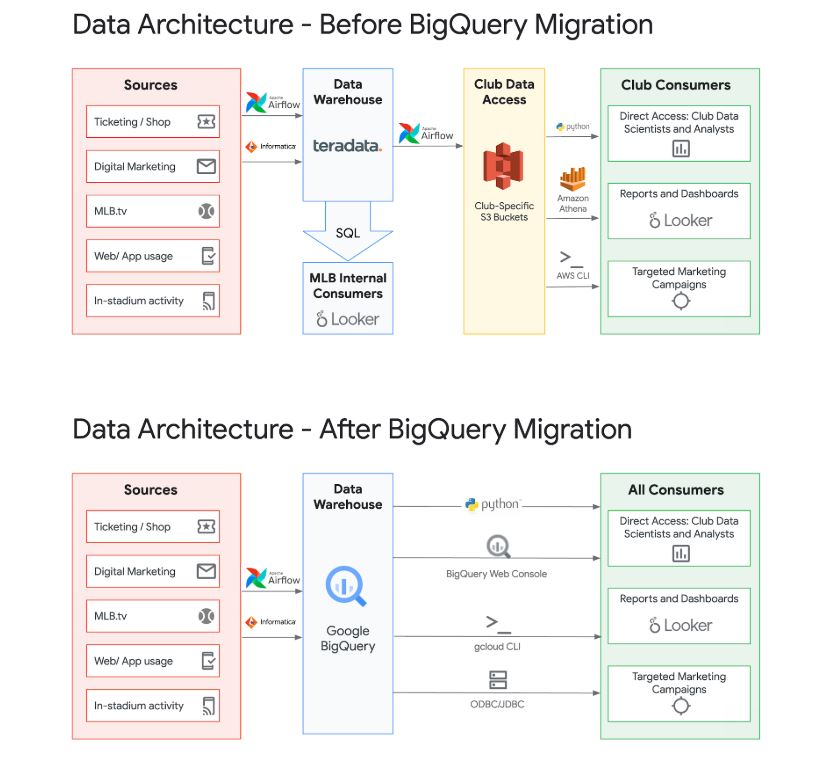 CLOUD
CLOUD
 CLOUD
CLOUD
 CLOUD
CLOUD
Amazon Web Services Inc. and Google LLC today both emphasized some of the gains to be made by customers migrating their most critical business operations to their respective cloud platforms.
Amazon said today the fast food restaurant chain Jack in the Box Inc. is going “all-in” on its cloud platform, moving the entirety of its information technology infrastructure from its on-premises data centers to the AWS cloud.
One of the main benefits for Jack in the Box and its franchises is that it can now use a common operational dashboard that’s powered by AWS to analyze all of its sales, inventory, food safety and labor patterns. This provides useful insights that can improve the daily operations of its business and eliminates time-consuming, manual tasks such as backing up servers on a regular basis.
In addition, the move to AWS has enabled Jack in the Box to enhance its digital ordering, dining and customer service experiences, it said. The company is leveraging a range of AWS machine learning services, including AWS Contact Lens, to understand its customer’s conversation sentiments. In turn, this allows it to develop new menus and promotions that are more appealing to its customer’s tastes.
There will be additional benefits in future too, as Jack in the Box says it’s exploring ways it can use AWS services such as Amazon SageMaker, which is a tool for building, training and deploying machine learning models. The idea is to use SageMaker to create new models that can predict customer traffic and optimize service times and food costs more accurately. It will also use Amazon Personalize, a machine learning-based service that helps companies create individualized recommendations, to create personalized food and beverage suggestions for repeat customers.
“As one of the nation’s first hamburger chains, we pride ourselves on being a leader in fast food innovation, offering customers creative new menu items and the ability to customize their meals,” said Jack in the Box Chief Information Officer Drew Martin. “By using AWS’ full portfolio of cloud services, we can continue to innovate new customer experiences while providing valuable information to our franchisees to help them operate more efficiently.”
Meanwhile, Google said Major League Baseball has migrated its massive enterprise data warehouse from its Teradata-based on-premises servers to Google BigQuery.
In a blog post today, Robert Goretsky, MLB’s vice president of data engineering, detailed the precise steps it went through in order to migrate its data to Google’s cloud without disrupting its daily business operations. The migration, which began in May 2019, proceeded without a hitch and was completed by November of that year, according to the organization, enabling MLB to realize numerous benefits that include simplifying its data architecture, lower costs, better performance and fewer operational overheads.

“With BigQuery’s on-demand pricing model, we were able to run side-by-side performance tests with minimal cost and no commitment,” Goretsky said. “By switching from on-demand to flat-rate pricing using BigQuery Reservations, we are able to fix our costs and avoid surprise overages, and share unused capacity with other departments in our organization, including our data science and analytics teams.”
On the performance side, Goretsky said MLB now can complete queries on its data 50% faster than it could before. In addition, BigQuery can perform more complex queries that Teradata was unable to handle.
“In many cases, queries that would simply time out or fail on Teradata (and impact the entire system in the process), or that were not feasible to even consider loading into Teradata, run without issue on BigQuery,” Goretsky said.
As a result, MLB can derive far more useful insights from its data. Goretsky explained that MLB takes advantage of Google’s BigQuery Data Transfer Service to integrate its data with services such as Google Ads, Google Campaign Manager and Firebase, which is Google’s application development framework. BigQuery also integrates with Looker, a Google-owned business intelligence tool that’s used by MLB.
Those integrations have enabled MLB to create various data-related initiatives that enhance the experience for its fans and boost the efficiency of its business. For example, MLB can now show personalized news articles to fans that visit MLB.com based on their favorite teams and communicate more pertinent information to each fan about any games they plan to attend.
On the business side, MLB now can generate more accurate revenue projections and churn out rate analyses for MLB.tv subscribers, as well as create new machine learning models that can predict fans’ future purchasing behavior. Finally, BigQuery enables MLB to share fan transaction and engagement data with each of its clubs, enabling them to make more informed decisions relating to their own businesses.
“With our modern data warehouse up and running, we’re able to serve data stakeholders better than ever before,” Goretsky said.
THANK YOU